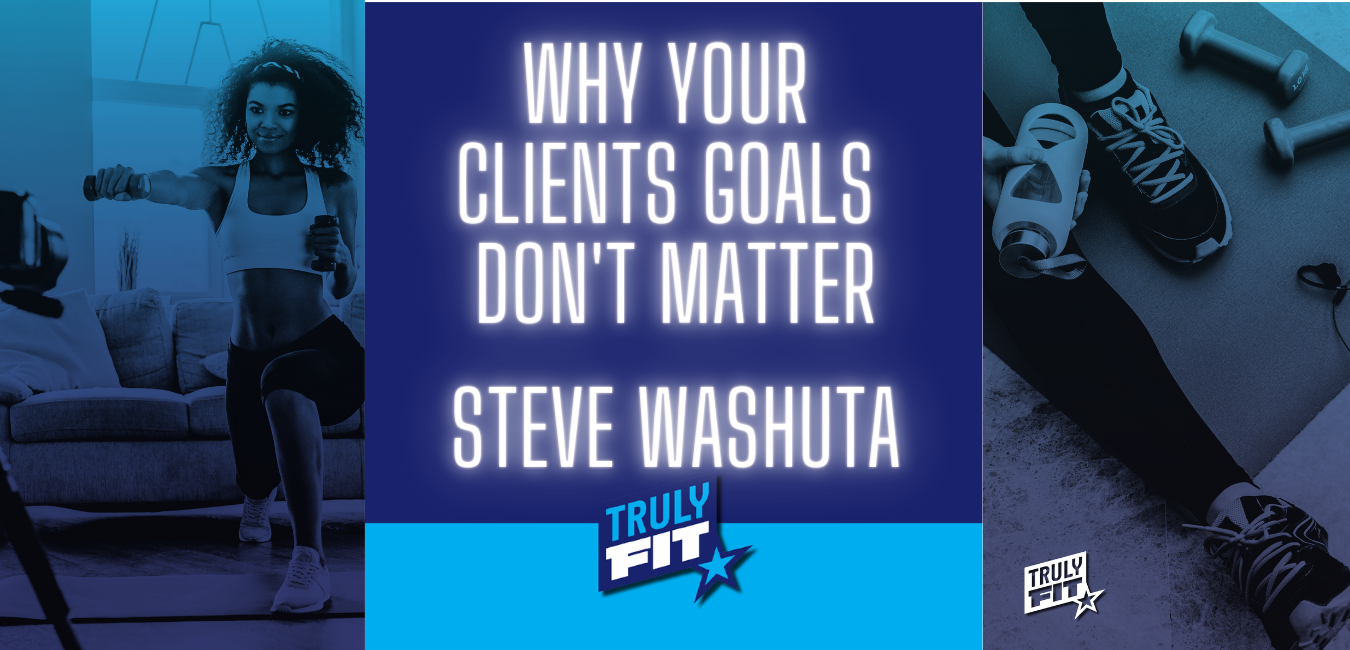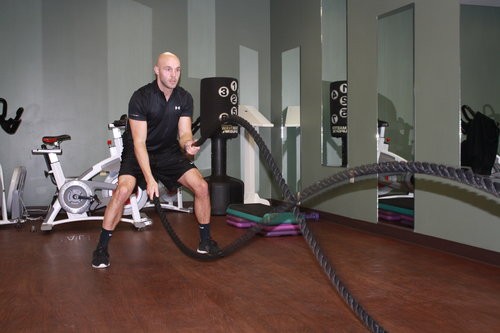
Goals – Steve Washuta

Guest: Steve Washuta
Podcast Release Date: 6/30/2021
Welcome to Trulyfit the online fitness marketplace connecting pros and clients through unique fitness business software.
Steve Washuta: Welcome to the Trulyfit podcast. I’m your host, Steve Washuta, co-founder of Trulyfit and ultra Fitness Business 101. On today’s podcast. It’s just me discussing why your client’s goals don’t matter. my client’s goals don’t matter. How could you say that, Steve? Well, yes, it is a little bit click Beatty, it’s certainly hyperbole here, of course, your client’s goals matter. But I believe there are two things that matter more than just meeting your client’s goals. And I’m going to go over both of those.
Number one, tempering expectations. Remember back to your childhood, maybe you were three or four or five years old, and your mom and your grandparents told you that you were going to be President of the United States. Or maybe they told you you were going to be an astronaut, then by the time you were 10, it was Wow, well, maybe we can get little Johnny into an Ivy League college.
Then by the time you were 16, it was maybe he could just be a scholarship to a local college. And that didn’t happen. And then you got into a four-year school and you graduate and then your own expectations might have been to get a really good job in the career field and what you studied, that probably didn’t happen, because it seems like none of us ever get jobs in the career field we study especially if you’re a personal trainer.
Before you know what you’re 28. And now your expectations are simply to have a job and what you can pay the mortgage and provide for your children and family most likely, right. So you see how expectations were tempered from you being president united states at some point you and your parents and your grandparents thought you would be too Now you just want to maintain a job to pay the mortgage. This is not a bad thing, right? and this is life.
This is what happens. We have to temper expectations over time. Of course, we set lofty goals. It’s okay for our clients to set lofty goals. But we need to understand that this affirmation storyline right is not a stretch to compare to our client’s fitness goals. Some clients will come to you with a goal of losing 30 pounds, some will come to you with a goal of vanity-related I want to see a four-pack and big biceps within a month. Eventually, sometimes these goals need to be tempered.
Steve Washuta : We need to reevaluate and reorganize these goals for our clients who want to sit down with them and do that on a right on with them and do that on a regular basis. Speaking of your President, which I just mentioned, every president of the United States has run on a platform of goals, none of them have met every single goal. It’s not because we’re bad people or they were lying. It’s just because new information comes about life happens.
There are things that we don’t see coming in our paths. And we have to deviate and we have to adjust. We have to learn to temper our client’s expectations when our clients come to us and they say they want a six-pack. But right now they have 20% body fat and 20 pounds overweight and they’re in their late 40s, we have to explain to them that this is going to take an absolute hero’s effort to do this. And then it’s unlikely, we have to be honest, we have to explain to them that many people have six-packs or potentially on hormones.
So they have really good genetics or they’re really young, or they’re just working extremely hard day at night through both diet and working out right excessive working out probably too It is to get to that point. And that working for three hours a week at 9am. With your trainer, that six-pack. That doesn’t mean you convince your client out of giving up that goal before you even start the process. It simply means that you rely on the front end for what it would take.
And that is a lofty goal conveyed that success and difficulty and vendor in these difficult endeavors can’t be thrown to the trainer right? The client cannot tell you why isn’t this working? I work with you three days a week, you have to convey to the clients that it’s their job to be working day and night on their own goals and that you were just a small part of it. Right? telling them that the likelihood of reaching their goals is accurate to what their goals actually are and not lie to your clients. Reason number two, again, what is more, important than your client’s goals? Why your client’s goals don’t matter. hyperbola your client’s goals do matter.
But Reason number one, what’s more, important is you need to temper their expectations. It’s not just about their goal. It’s about reevaluating their goals. And their reason number two is that there’s ultimately one universal goal that overrides all of their goals. If you have a client whose goal is to squat 500 pounds, that goal should still not take precedent over our universal goal. And what is that universal goal long term health and wellness if you believe the training is potentially injuring your client short term which can hinder their long term health, you must dial back that training It is our duty as the experts to continuously relate to the client that we want them healthy and happy and moving the same way they do in their 30s well into the 50s 60s and 70s.
If you are a physician, it’s your duty to explain that medications are particular procedures that will have short-term positive effects could have long-term negative effects right and as for most things in life, fixes are not perfect. There’s no perfect solution. There are only trade-offs. There are no free lunches to bring this full circle back to fitness, our clients and the client’s goals. have to take a backseat to long-term health and wellness.
Steve Washuta : young professionals who may have not worked with older populations and are naive, in some instances might not see this. But I can assure you that almost all of my senior clients had wished they had been working out differently focused more on their whole lives focusing more on a full-body range of motion and functional patterns and all-around movement and injury prevention. And in addition, they probably just wish they were working out more. Our best marketing tool is simply to remind clients that they’re only getting older.
Many of my clients were extremely wealthy. But they did a poor job of using that same focus and energy and effort they did to advance their careers, into assuring that their body was holding up for retirement, what is the point of having all of that money?
What are the point of retiring and 55 or 60, if you have back problems that stop you from getting on the floor to play with your grandkids, if you have heart issues that don’t allow you to travel across the world, if you have obesity-related problems that are keeping you from that Machu Picchu hike you have always dreamed of and will be saved for reminding your clients whatever goal they think they have, should not be superseded by their long term health and wellness ultimately, meaning our clients goal is a part of the job, I understand that we must do that?
But we have a responsibility to guide them towards their long-term health, short-term micro-goals. Like running, running a half marathon, let’s say a bikini stage competition, bigger arms, a flatter tummy, maybe even a local strongman competition. These are fantastic. These are great Go for it. It keeps our clients locked in and focused and dedicated, dedicated to a task in which you know, we also get to learn along the way of their journey.
We get to learn how to train somebody for these particular events, which makes us stronger, we also get to bond with our clients. And all while we’re tinkering with their bodies and programs which makes us better trainers.
However, that universal goal of long term health and wellness whether stated or not should be our first obligation Nothing is more important than to help our clients or any life, even if it’s someone that’s not directly our client, any person keep physically unobstructed for lack of a better term as they grow into old age. In summation here, of course, it’s hyperbole to say that our client’s goals don’t matter.
They certainly do. But they need to be secondary to the universal goal of long-term health and wellness. In addition, we need to temper our client’s expectations or at least be very thorough and honest in our explanations, that we are not miracle workers, and that most of the work is not done with your trainer. It is done in those hours when you’re alone.
When you decide to wake up and take that morning jog, instead of sleeping, or to have that smoothie instead of two cupcakes. Don’t allow your clients to convince themselves that hiring a trainer and having a few short-term goals equates to an antidote for overall bad health. Be mindful of tempering and updating your client’s goals as your health journey continues together.
Thanks for joining us on the Trulyfit podcast. Please subscribe, rate, and review on your listening platform. Feel free to email us as we’d love to hear from you.
Thanks again!
CLICK FOR AUDIO OF PODCAST





